
Sixth Session of the Plant Treaty’s Governing Body, Rome, 2015
Stakeholders involved in Farmers Rights had great expectations to the Sixth Session of the Governing Body of the International Treaty on Plant Genetic Resources for Food and Agriculture (ITPGRFA), that was held in Rome, 5-9 October 2015. At this session the Secretariat was to present a review of submissions from parties and stakeholders on knowledge, views, experiences and best practices related to Farmers’ Rights since the Treaty came into force, and to derive examples in a systemic way, as options for national implementation of Article 9 of the Plant Treaty. This had been requested by the Governing Body at its Fifth Session two years earlier in Oman.
A report (PDF) was presented, based on all submissions so far on Farmers’ Rights, i.e. from 17 countries being parties to the Treaty and from 17 stakeholders. A further group of stakeholders submitted input through an addendum (PDF) to the report. Nevertheless, the report did not live up to expectations, as it did not cover much of the contents of the submissions, and thus this rich source of experiences and reflections regarding Farmers’ Rights was not sufficiently represented. Even if the report had a table, it did not derive examples in a systemic way, as options for national implementation of Article 9 of the Plant Treaty. The report can be regarded as a lost opportunity to make major steps forward regarding the implementation of Farmers’ Rights.
Nevertheless, delegations seeking to promote Farmers’ Rights under the Treaty at the Sixth Session were seeking solutions that could help making progress. The resolution on Farmers’ Rights that was adopted at this Sixth Session, Resolution 5/2015 (PDF), represented new efforts in this regard. It was now decided that the Secretary, subject to the availability of financial resources, should prepare a study on lessons learnt from the implementation of Farmers’ Rights as set out in Article 9 of the Treaty, including policies and legislation. Contracting Parties and all relevant stakeholders, especially farmers’ organizations, were invited and encouraged to submit their views and experiences, so that the Secretary could derive examples as possible options for national implementation of Article 9 on Farmers’ Rights. The study resulting from this work should be presented at the Seventh Session of the Governing Body.
It was also decided that success stories from the national implementation of Farmers’ Rights should be compiled and presented at the next session of the Governing Body.
Furthermore, the Secretary was requested, subject to the availability of financial resources, to launch and implement a Joint Capacity Building Programme with the Global Forum on Agricultural Research (GFAR) and other relevant organizations on Farmer’s Rights, to finalize a learning module on Farmers’ Rights and conduct active outreach on Farmers’ Rights.
Countries were encouraged to develop national action plans for the implementation of Article 9 and to consider reviewing and adjusting national measures affecting the realization of Farmers’ Rights, to protect and promote these rights.
Importantly, the resolution also provided that Contracting Parties and relevant organizations should take initiatives to convene regional workshops and other consultations including with farmers’ organizations, for the exchange of knowledge, views and experiences to promote the realization of Farmers’ Rights as set out in Article 9 of the Treaty, and present results at the next session of the Governing Body. The Secretary was requested to facilitate such initiatives, subject to the availability of financial resources.
The Secretary was requested to continue engaging, in a mutually supportive manner with the International Union for the Protection of New Varieties of Plan (UPOV) and the World Intellectual Property Organization (WIPO) to jointly, and including through a participatory and inclusive process, finalize the identification of possible areas of interrelations between their respective instruments and the Treaty and report on the outcomes to the Seventh Session of the Governing Body.
Finally, Contracting Parties and development cooperation organizations were invited to consider providing financial and technical support for the implementation of Farmers’ Rights as set out in Article 9 of the Treaty in developing countries, and to enable farmers and representatives of farmers’ organizations to attend meetings under the International Treaty. Contracting Parties in a position to support such processes, were called upon to facilitate such support for the implementation of the activities foreseen in the resolution.
These provisions, and particularly the one on organizing consultations on Farmers’ Rights, set the stage for the ensuing Global Consultation on Farmers’ Rights that took place in Bali, Indonesia, in 2016.
Text by Regine Andersen